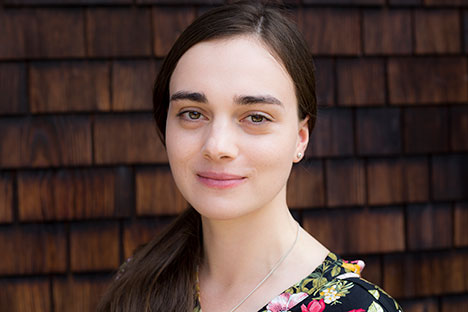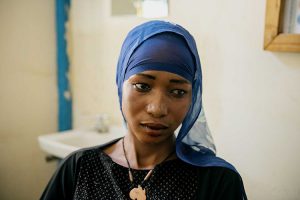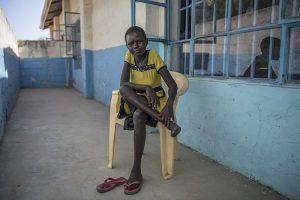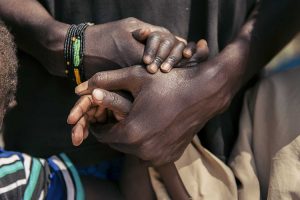
2018 Dorothea Lange Fellow
Rosa Furneaux
Rosa Furneaux, a student in UC Berkeley's Graduate School of Journalism, is the 2018 winner of the Dorothea Lange Fellowship, an award given to a graduate student or faculty member who has demonstrated outstanding work in documentary photography and a creative plan for future work. Berkeley News spoke with Furneaux, who discussed how the fellowship will allow her to photograph girls and young women in Kenya who have been pushed into sex work by climate change. The project will be a follow-up to her master's thesis.

Photos by Rosa Furneaux
Berkeley News: Can you tell me about your proposed project?
Rosa Furneaux: My project is looking at the impact of climate change on women and young girls, specifically how the prolonged drought in northern Kenya has pushed young women and adolescent girls into sex work.
Many of these girls are from pastoralist tribes that have traditionally subsisted on cattle farming and moving around the region, and that's just no longer possible for them now. Girls are either being forced into early marriage or they're being asked by their families to fend for themselves, and ideally, bring in money for the family. And the only place they can do that is in the city.
So a lot of girls arrive in Lodwar, a city in the northwestern province in the poorest region of the country, thinking they'll be domestic helpers, cleaners in people's houses. What they find when they get to the city, of course, is that those jobs don't pay enough for them to live, let alone send money back to their families. So they're turning to the one thing that seems in any way lucrative: sex work.
Do you find that part of your work as a photojournalist involves sitting down with people and hearing about their lives?
For sure, especially with longterm projects like this one. The most important part of this project is building trust. Without trust, you can't do anything else. And building trust often means not using your camera for the first day, first two days, first week. It's about sitting down, hearing people, introducing who you are and being very gentle and open.
And you really need to live up to that trust throughout the project. It's not enough to gain someone's trust and then think, "I have free rein over this story now." You have to keep that openness as you go through and make sure you are always sensitive to the way that you're portraying people and the way you're telling someone's story.
Dorothea said we see "with all that we are." I hope that I can undertake this project in her spirit of compassion, courage and curiosity.

You visited Lodwar in December to do interviews for your written thesis. How did you gain the trust of the women and girls you spoke with?
It can be a challenge, for sure, not just as a journalist, when you're trying to get information from someone, but as a journalist - where you have to decide if you're in a situation which is fair and ethical and which is treating your subject as a human being and not simply as a source.
I was very lucky to partner with their caseworker, Leah Muruka, who runs a clinic in town. Leah was really my way into that world. She already had a relationship with the girls and was able to vouch for me that I was there in a capacity that wasn't harmful. So I was able to kind of quickly make that bond.
Leah allowed me to sit in on a group meeting at the clinic, a psycho-social support group for some of the adolescent sex workers. Once Leah said, "This is Rosa, she's from America. She's here to talk to you," a lot of them did immediately open up. I asked very simple questions, you know, "Can you tell me about your work?" They really wanted, it felt to me, to express what was happening in their lives.
When you start to get to know your subjects more intimately, do you feel a growing responsibility toward them?
For me, I almost overthink it before I go into a situation. I walk in assuming that I have to be the person to safeguard all of that. What I have found over the course of doing different projects is that people trust me more than I realize. So long as you as the photographer are thinking clearly and carefully about these issues, you're not going to overstep that boundary. You're not going to put anyone in danger or cross an ethical line if you're thinking about it in that much detail.
So certainly when I work with the girls in Kenya, the ethical issues are just heightened because of their age, because of the nature of the story. And because of the idea of photographing these girls who are incredibly vulnerable on so many levels, not only in the fact that they are survival sex workers, but in the fact that they are Kenyan and they come from a deprived situation. I have to think about those things very carefully. But I think it's also right that if I see something and I think it's important to photograph it or learn more about it, that I approach them and say, "Would you feel comfortable telling me about this?"

When do you plan to go back to take photos of the girls and women in Lodwar?
My hope is to go back this summer for three to four weeks, reintegrating myself into the community and really spending a lot of time with the girls, specifically as a photographer. I expect to spend a few days not taking my camera out of the bag, just reminding people who I am and explaining what it is I want to do. I'd like to work solo as much as possible. I'll see what the girls are comfortable with and whether they would be happy with me visiting where they live and maybe the villages outside Lodwar where they grew up.
I really believe that this story is an important touchstone for what may be to come. As the planet warms, climate change will affect all of us, but the impact will be most devastating on the planet's most vulnerable.
What kind of impact do you hope your project will have?
As journalists, we always hope that our work will affect change - that if we bring things to light, people will take action. A photograph is a powerful thing. It says, "Look, this happened." Dorothea's work, along with her partners in the Farm Security Administration, changed a nation. But the truth is that that's very rare.
I never tell my subjects that I expect things to change for them because a story is published. Instead, I usually frame it as a collaboration, in the sense that, in telling me their story or letting me into their world, my subjects can help me understand what they're experiencing. Bringing awareness is a more modest aim than bringing change, but it's also the first step towards making a difference. If my work can be one small piece of a wider movement, or shift the needle a little in the direction of progress, it will have been worthwhile.
Ultimately, my hope for this project is to remind people that this suffering exists, and to give a window into that experience which humanizes the women who have no choice but to live it. These women share the same hopes of any mother, any daughter. They should not be strangers to us.
